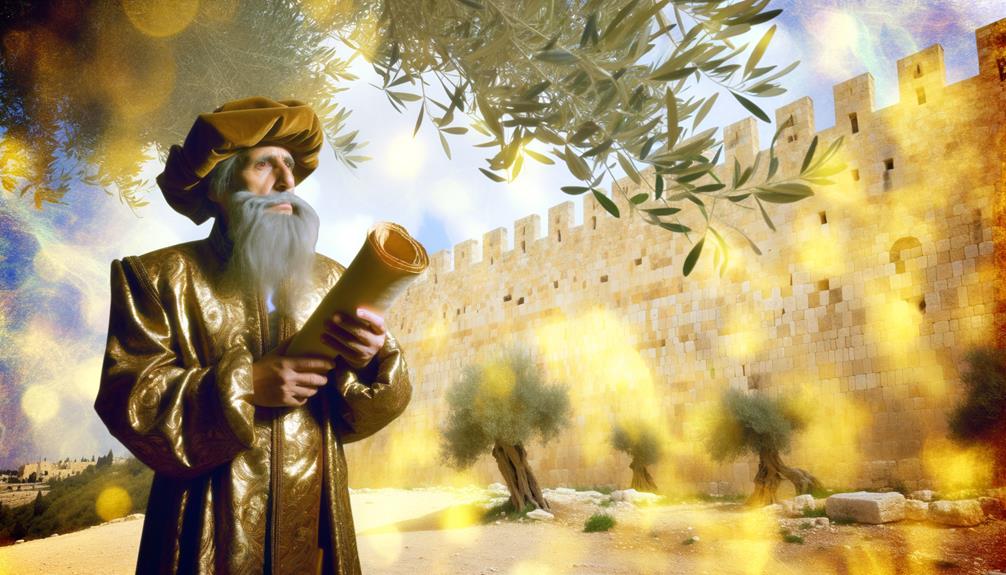Biblical Meaning of Name Mordecai
The name Mordecai, originating from the Hebrew 'Mordochai' and related to the Babylonian god Marduk, means 'servant of Marduk'. Historically, Mordecai is a key figure in the Book of Esther, renowned for his leadership and unwavering integrity.
His refusal to bow to Haman and his pivotal role in saving the Jewish community from genocide under Persian rule underscore themes of courage, faith, and resilience. Mordecai's actions laid the foundation for the Jewish festival of Purim, signifying his enduring legacy and profound impact on Jewish tradition.
Exploring his story further reveals deeper layers of his remarkable influence.

Key Takeaways
- Derived from Hebrew, Mordecai implies 'servant of Marduk,' linking to Babylonian cultural influences.
- Symbolizes leadership, courage, and moral integrity in the Jewish tradition.
- Reflects Jewish resilience and faith during Persian rule.
- Represents a heroic figure who guided Esther and thwarted Haman's genocidal plans.
- Celebrated annually through the festival of Purim, reinforcing Jewish communal identity.
Etymology of Mordecai
The etymology of the name Mordecai is a topic that delves into the intricate interplay of linguistic origins, historical contexts, and cultural influences that shape its meaning and significance. Derived from the Hebrew name מָרְדֳּכַי (Mordochai), it is often linked to the Babylonian god Marduk, suggesting a syncretic blend of Hebrew and Babylonian elements.
The suffix '-ai' is a Hebrew linguistic marker denoting possession or association, thereby rendering the name to imply 'belonging to Marduk' or 'servant of Marduk.' This etymological background highlights the historical interactions between Jewish and Babylonian cultures, reflecting the complex socio-religious landscape of ancient Mesopotamia.
Such a name encapsulates the multifaceted layers of identity and influence during the era.
Mordecai in the Book of Esther
Central to the narrative of the Book of Esther, Mordecai emerges as a pivotal figure whose actions and decisions greatly influence the course of events within the Persian Empire.
As Esther's cousin and guardian, his guidance shapes her rise to queenship.
Mordecai's unyielding refusal to bow to Haman, a high-ranking official, sets off a chain reaction of events that threaten the Jewish population.
Demonstrating strategic acumen, Mordecai uncovers a plot against King Xerxes and later devises a plan to counter Haman's genocidal decree.
His wisdom and steadfastness not only save his people but also elevate him to a position of influence.
In this way, Mordecai's role is integral, underscoring themes of loyalty, courage, and divine providence.
Historical Context
To fully understand the significance of Mordecai's name, it is essential to ponder the historical context of the Persian Empire, where the Jewish exile was a poignant reality.
Mordecai's role as Esther's cousin and guardian places him within the intricate socio-political landscape of a displaced Jewish community maneuvering life under Persian rule.
This backdrop illuminates the broader implications of his actions and the enduring legacy of his name.
Persian Empire Setting
Amid the expansive and multifaceted Persian Empire, the story of Mordecai unfolds within a rich tapestry of historical and cultural influences that shaped the era. This vast empire, under rulers such as Xerxes I, was marked by its administrative sophistication and cultural diversity.
Understanding the Persian Empire's context is vital for several reasons:
- Political Structure: The centralized power of the Achaemenid dynasty facilitated the integration of various ethnic groups, including Jews, within its administration.
- Cultural Exchange: The empire's extensive trade networks allowed for significant cultural and intellectual exchange, impacting societal norms and practices.
- Legal Systems: Persian legal codes influenced the rules and regulations governing different populations, including the Jewish community.
These aspects provide a backdrop for Mordecai's narrative within the Persian Empire.
Jewish Exile Background
The Jewish exile, a pivotal event in the history of the Jewish people, was marked by the Babylonian conquest of Judah and the subsequent deportation of Jewish elites to Babylon in the 6th century BCE. This period of displacement had a profound impact on Jewish culture, religion, and identity.
The loss of the Temple in Jerusalem forced the Jewish community to adapt their religious practices, leading to the development of synagogues and a greater emphasis on the Torah. Under Babylonian rule, the exiled Jews maintained their distinct identity while dealing with the intricacies of living in a foreign land.
This historical backdrop is essential for understanding the environment in which Mordecai, a key figure in the Book of Esther, lived and operated.
Esther's Cousin Role
Mordecai, whose role as Esther's cousin and guardian places him at the heart of the narrative, maneuvers the complexities of Persian court life with a blend of shrewdness and steadfast faith. His involvement can be analyzed through three key aspects:
- Adoption and Guardianship:
Mordecai's decision to adopt Esther after her parents' death signifies his deep familial loyalty and responsibility, ensuring her upbringing within Jewish traditions.
- Political Acumen:
His ability to uncover a plot against King Xerxes exemplifies his strategic thinking and his commitment to protecting both the Jewish people and the Persian state.
- Mentorship:
Mordecai's guidance to Esther, particularly in advising her to conceal her Jewish identity and later to reveal it, underscores his wisdom and foresight in maneuvering court politics.
Symbolism and Meaning
Examining the symbolism and meaning of the name Mordecai reveals a rich tapestry of cultural, historical, and religious connotations that extend beyond its biblical origins. The name Mordecai, rooted in Persian and Hebrew traditions, signifies a complex interplay between identity and destiny. In Hebrew, Mordecai is thought to mean "warrior" or "follower of Marduk," the Babylonian deity.
| Aspect | Meaning | Context |
|---|---|---|
| Hebrew | Warrior | Reflects strength and protection |
| Persian | Follower of Marduk | Indicates cultural integration |
| Biblical | Defender of Jews | Symbolizes leadership and courage |
| Historical | Exile and Diaspora | Represents resilience and faith |
This multidimensional nomenclature underscores Mordecai's pivotal role in Jewish narrative and identity.
Mordecai's Role in Jewish Tradition
In Jewish tradition, Mordecai's role is profoundly significant, embodying themes of leadership, courage, and unwavering faith amidst adversity. His strategic interventions and moral fortitude are pivotal in the narrative of the Book of Esther, where he rises to prominence as a guardian of the Jewish people during their exile in Persia.
Mordecai's influence is multifaceted:
- Political Savvy: He navigates the complexities of the Persian court, securing favor with the king and protecting his people.
- Moral Integrity: His refusal to bow to Haman exemplifies a steadfast commitment to Jewish principles.
- Communal Leadership: Mordecai's guidance unites the Jewish community, culminating in the establishment of the festival of Purim, celebrating their deliverance.
These elements underscore his enduring legacy in Jewish thought and tradition.
Lessons From Mordecai's Life
Mordecai's life provides profound lessons in courage and integrity, particularly in the face of adversity. His unwavering loyalty to his people and ethical steadfastness offer timeless examples of moral fortitude.
Courage in Adversity
The narrative of Mordecai in the Book of Esther demonstrates a profound example of courage in adversity, as he steadfastly refused to bow to Haman despite the potential for grave personal repercussions. Mordecai's actions illustrate the following key lessons:
- Unwavering Principle: Mordecai's refusal to bow highlights his commitment to his beliefs, even when faced with life-threatening consequences.
- Strategic Wisdom: His guidance to Esther to intercede with the king exemplifies a calculated approach to overcoming adversity.
- Resilience: Despite the decree to annihilate the Jews, Mordecai's persistence and faith were instrumental in galvanizing the Jewish community to fast and pray, demonstrating the power of collective resilience.
These elements underscore the critical role of courage in navigating and surmounting formidable challenges.
Loyalty and Integrity
Building on Mordecai's demonstration of courage in adversity, his unwavering allegiance and steadfast honesty further illuminate the depth of his character and the principles that guided his actions throughout the narrative.
Mordecai's allegiance to King Ahasuerus is evidenced by his prompt reporting of a conspiracy against the king, demonstrating his commitment to justice and the safety of the kingdom. His refusal to bow to Haman reflects his integrity, grounded in his adherence to his faith and values. These actions underscore a life led by ethical convictions rather than personal gain.
Mordecai's story teaches that true allegiance and integrity involve steadfastness in one's principles, even when faced with personal risk, offering timeless lessons in moral fortitude.
Mordecai's Legacy
Throughout history, Mordecai's acts of courage and wisdom have left an indelible mark on Jewish tradition and collective memory. His legacy can be analyzed through several key aspects:
- Heroism: Mordecai's refusal to bow to Haman, despite the risk to his own life, epitomizes his bravery and uncompromising faith, inspiring countless generations.
- Wisdom: His strategic guidance to Queen Esther in navigating the perilous political landscape of the Persian court underscores his profound insight and tactical acumen.
- Cultural Impact: The establishment of the Jewish festival of Purim, commemorating the deliverance of the Jews, ensures that Mordecai's legacy continues to be celebrated annually, reinforcing communal identity and historical continuity.
These elements collectively highlight Mordecai's enduring influence within Jewish heritage.
Conclusion
Mordecai's name, deeply rooted in etymology and historical context, carries significant symbolism in the Jewish tradition. His steadfastness in the Book of Esther exemplifies unwavering faith and courage.
For instance, a hypothetical study of Mordecai's intervention in saving the Jewish people during the Persian Empire could be paralleled with modern examples of moral leadership in times of crisis.
Consequently, Mordecai's legacy endures, offering profound lessons in resilience, integrity, and the power of individual action within a collective narrative.






